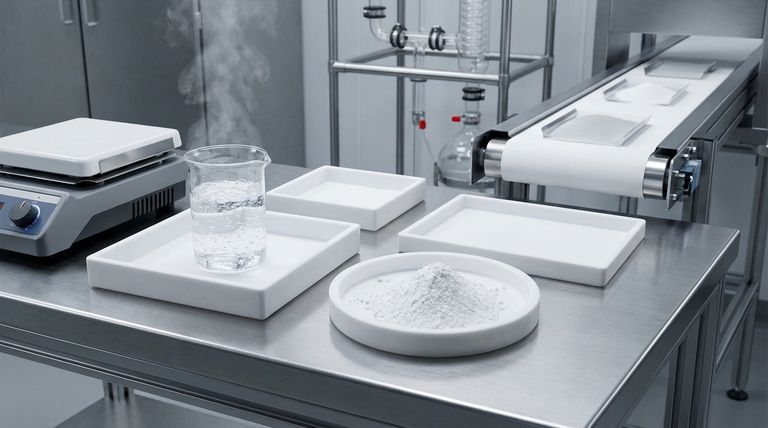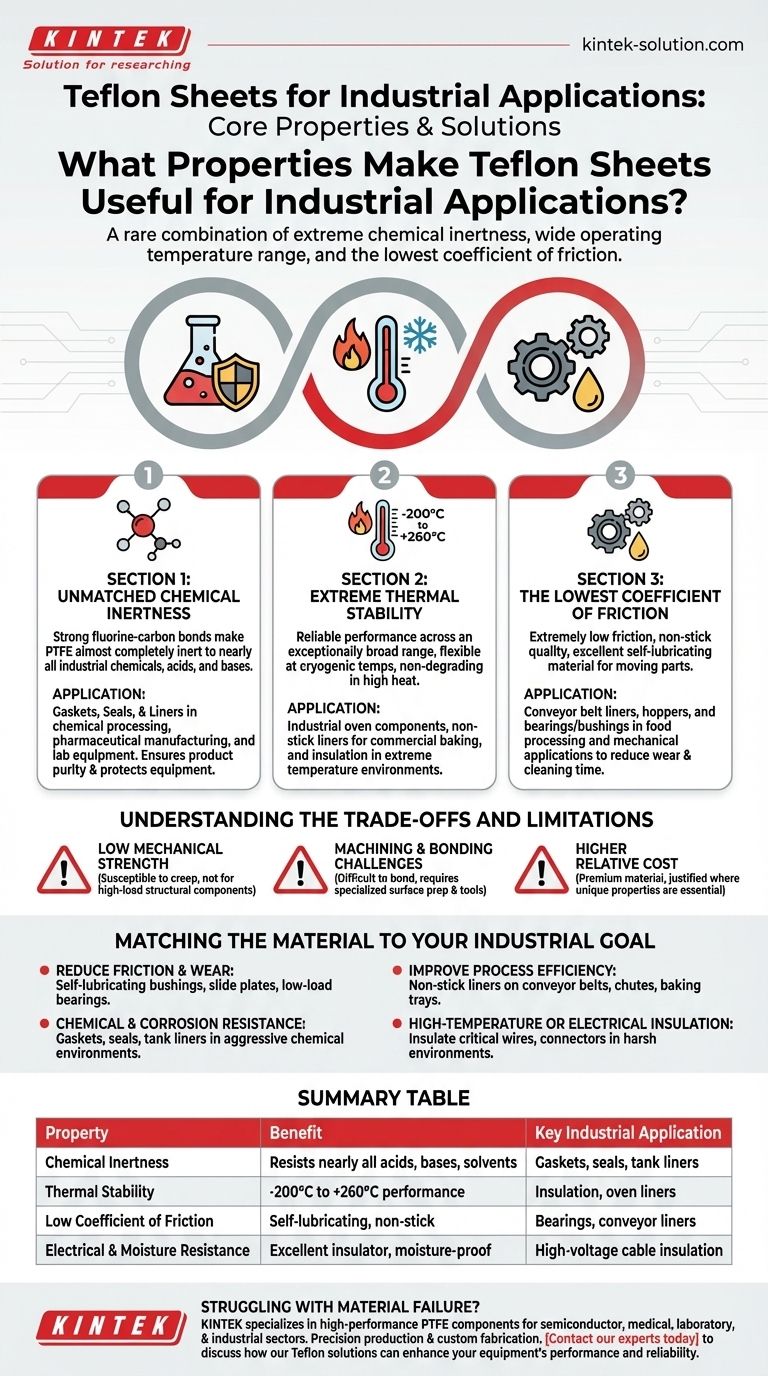In short, Teflon (PTFE) sheets are exceptionally useful for industrial applications due to a rare combination of three core properties: extreme chemical inertness, a very wide operating temperature range, and one of the lowest coefficients of friction of any solid material. This unique profile makes it a high-performance problem-solver in environments where most other materials would quickly degrade or fail.
While many materials offer a single benefit like heat resistance or chemical stability, Teflon's value lies in its simultaneous mastery of multiple domains. It is the go-to material for applications demanding non-reactivity, temperature resilience, and self-lubrication all at once.

The Core Properties Explained
To understand why Teflon is a staple in demanding industries, we must look beyond the surface and see how its unique molecular structure translates into tangible benefits.
Unmatched Chemical Inertness
The strength of the fluorine-carbon bonds in Polytetrafluoroethylene (PTFE) makes the material almost completely inert. It is non-reactive to nearly all industrial chemicals, acids, and bases.
This property makes Teflon sheets indispensable for use as gaskets, seals, and liners in chemical processing, pharmaceutical manufacturing, and laboratory equipment. It ensures product purity and protects equipment from corrosion.
Extreme Thermal Stability
Teflon performs reliably across an exceptionally broad temperature range, typically from -200°C to +260°C (-328°F to +500°F). It remains flexible at cryogenic temperatures and does not degrade in high-heat applications.
This makes it ideal for components in industrial ovens, non-stick liners for commercial baking, and insulation in equipment that experiences extreme temperature fluctuations.
The Lowest Coefficient of Friction
Known commercially as its "non-stick" quality, Teflon's extremely low friction means materials do not adhere to its surface. This same property also makes it an excellent self-lubricating material for moving parts.
In food processing, this prevents buildup on conveyor belts and hoppers, reducing cleaning time and improving efficiency. For mechanical applications, it is used for bearings and bushings to reduce wear and absorb vibration without external lubricants.
Superior Electrical and Moisture Resistance
Teflon is an exceptional electrical insulator and does not absorb moisture. This dual benefit makes it a first-choice material for insulating high-voltage cables and electronic components, especially in humid or wet environments where corrosion is a concern.
Understanding the Trade-offs and Limitations
No material is perfect. Acknowledging Teflon's limitations is critical for successful application and avoiding costly failures.
Low Mechanical Strength
While its low friction reduces wear between parts, Teflon itself is a relatively soft material. It is susceptible to "creep" (slow deformation under constant load) and can be damaged by sharp or abrasive materials.
It should not be used for high-load structural components. Its strength lies in sliding and sealing applications, not bearing heavy weight.
Machining and Bonding Challenges
The very non-stick properties that make Teflon useful also make it difficult to bond to other surfaces using conventional adhesives. Specialized surface preparation techniques are required.
Furthermore, its softness requires specific tools and expertise to machine properly without causing deformation or poor finishes.
Higher Relative Cost
Compared to common commodity plastics like nylon or polyethylene, PTFE is a premium material with a higher cost. Its use is best justified in applications where its unique combination of properties is essential and other materials would fail.
Matching the Material to Your Industrial Goal
To apply this knowledge effectively, select Teflon based on the primary problem you need to solve.
- If your primary focus is reducing friction and wear: Use Teflon for self-lubricating bushings, slide plates, and low-load bearings to ensure smooth motion and minimize maintenance.
- If your primary focus is chemical and corrosion resistance: Specify Teflon for gaskets, seals, and tank liners that will be exposed to aggressive chemicals.
- If your primary focus is improving process efficiency: Employ Teflon sheets as non-stick liners on conveyor belts, chutes, and baking trays to prevent material buildup and speed up cleaning cycles.
- If your primary focus is high-temperature or electrical insulation: Choose Teflon for insulating critical wires, connectors, and components in harsh thermal or high-frequency electronic environments.
Ultimately, Teflon is a specialized tool engineered to solve problems of friction, chemical attack, and extreme temperatures where conventional materials fall short.
Summary Table:
| Property | Benefit | Key Industrial Application |
|---|---|---|
| Chemical Inertness | Resists nearly all acids, bases, and solvents | Gaskets, seals, and tank liners for chemical processing |
| Thermal Stability (-200°C to +260°C) | Performs in cryogenic to high-heat environments | Insulation, oven liners, and components |
| Low Coefficient of Friction | Self-lubricating and non-stick | Bearings, bushings, and conveyor liners for food processing |
| Electrical & Moisture Resistance | Excellent insulator, even in wet conditions | High-voltage cable and electronic component insulation |
Struggling with material failure from friction, chemicals, or extreme temperatures?
KINTEK specializes in manufacturing high-performance PTFE components like seals, liners, and custom labware for the semiconductor, medical, laboratory, and industrial sectors. We deliver precision production and custom fabrication—from prototypes to high-volume orders—to solve your most demanding application challenges.
Contact our experts today to discuss how our Teflon solutions can enhance your equipment's performance and reliability.
Visual Guide

Related Products
- Custom PTFE Parts Manufacturer for Teflon Containers and Components
- Custom PTFE Parts Manufacturer for Teflon Parts and PTFE Tweezers
- Custom PTFE Sealing Tapes for Industrial and High Tech Applications
- Custom PTFE Sleeves and Hollow Rods for Advanced Applications
- Customizable PTFE Seals Filter Holders for Versatile Applications
People Also Ask
- What are the key advantages of PTFE rotary seals over traditional rubber seals? Superior Performance in Extreme Conditions
- What are the general conclusions about PTFE and PEEK for ball valve seats? PTFE vs. PEEK for Valve Performance
- Why are PTFE Teflon washers used in aerospace applications? Solving Critical Engineering Challenges
- How do PTFE ring gaskets benefit piston engines? Enhance Engine Reliability and Longevity
- In which industries are Teflon backup rings commonly used? Prevent Seal Failure in High-Pressure Systems
- What are the two main methods for manufacturing pure PTFE gaskets? Molding vs. Cutting Explained
- Why are PTFE O-rings non-stick? Unlock the Molecular Secret to Frictionless Sealing
- Are PTFE flange gaskets customizable? Tailor Your Sealing Solution for Peak Performance



















